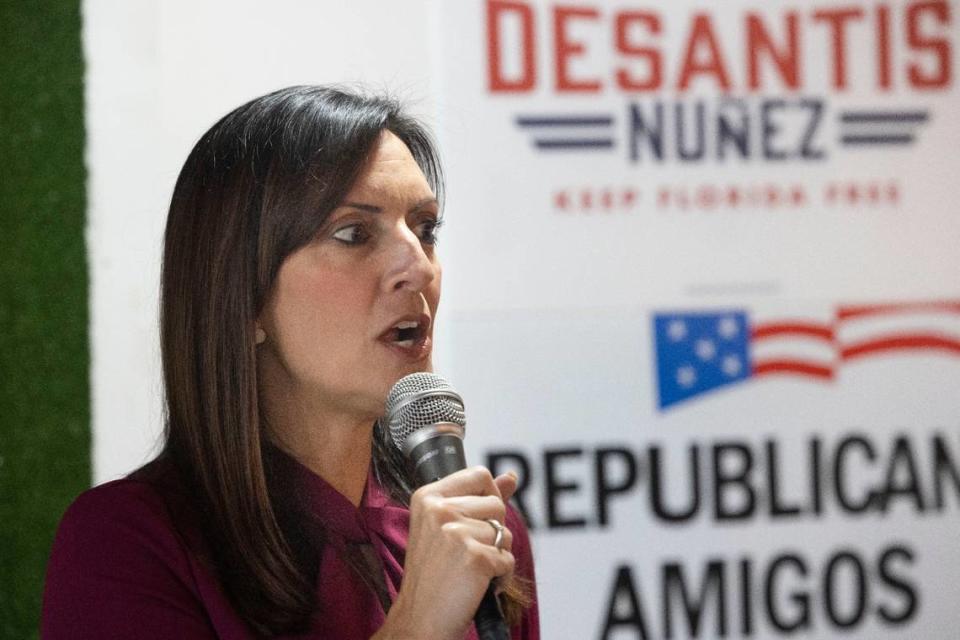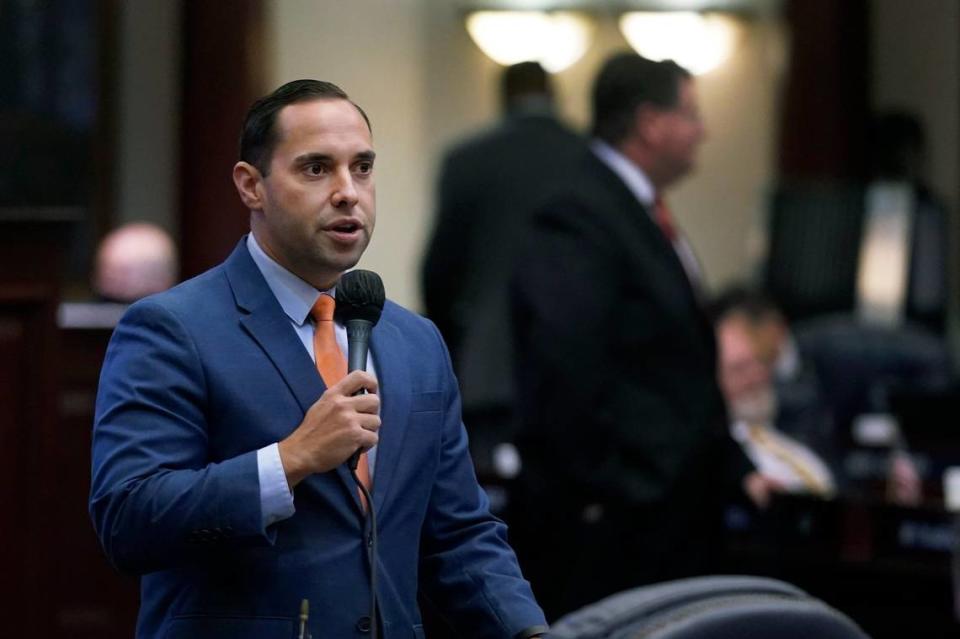Dems blame ‘grudge’ by Lt. Gov. Nuñez for latest state takeover bid of Miami toll roads
- Oops!Something went wrong.Please try again later.
- Oops!Something went wrong.Please try again later.
- Oops!Something went wrong.Please try again later.
The extended political drama behind Miami-Dade County’s busiest toll expressways now involves a hypothetical transportation project in the Big Cypress swamp and an alleged years-long grudge held by Florida’s lieutenant governor.
Both topics were cited in Tuesday’s debate in the Florida Senate over the latest attempt by the Legislature to take over the Miami-Dade Expressway Authority (MDX). That’s a county controlled toll board that runs five of the area’s busiest commuting routes, including the Dolphin and Snapper Creek expressways.
The Republican-controlled Senate passed the bill after the House passed similar legislation last week to create a replacement agency controlled by appointees of Gov. Ron DeSantis. The governor signed a similar bill into law in 2019 only to see it struck down after court challenges by Miami-Dade and MDX.
READ MORE: Who controls the Dolphin Expressway and can spend $200M in tolls? MDX goes to court
Democratic opponents blame the revived attempt on one of MDX’s longest-running foes: Lt. Gov. Jeanette Nuñez, who clashed with the agency when she was a Miami-area member of the Florida House and the board was chaired by Maurice Ferré, a former Miami mayor who died in 2019.
Prior versions of anti-MDX legislation included a provision that the agency head at the time of the toll expansion, Javier Rodriguez, could not apply to run the replacement toll system.
“This is a grudge. And all of the names have changed. Those that hold grudges have actually ascended in power and control,” said Sen. Jason Pizzo, a Democrat representing parts of Miami-Dade, said during the debate. “The lieutenant governor didn’t like the last director. I get it.”
In an interview, Sen. Shevrin Jones, also a Democrat from Miami-Dade, called the legislation “a continuation of the lieutenant governor’s vendetta against MDX.”
The governor’s press office did not immediately respond to a request for comment on Pizzo’s comments about Nuñez.

It started when Nuñez was in the House
When Nuñez was in the Florida House she joined other Miami-Dade Republicans in opposing MDX toll increases in 2014, then backed a string of bills aimed at restricting the agency’s powers and requiring discounts. MDX opposed the laws, saying it jeopardized the low interest rates that come with it being viewed by lenders as an independent toll authority.
In defending the bill on the Senate floor Tuesday, Sen. Bryan Avila, a Republican from Hialeah Gardens, didn’t address the grudge allegations but said MDX deserves to be replaced by a state-controlled board.
“I am 100% convinced that the folks that remain there have a culture that does not put the residents of Miami-Dade County first,” he said. “Unfortunately, MDX has shown a history and a tendency to put its interests before the residents.”

The Avila legislation is part of a larger transportation bill (House Bill 1305) that passed its final in the House of Representatives on Wednesday, sending it to DeSantis for his signature.
It would create the Greater Miami Expressway Agency (GMX) to take over MDX and its five roads, which also include the Airport, Don Shula and Gratigny expressways. Together, they generate more than $200 million in toll revenue a year.
When Tallahassee tried this in 2019, judges suspended the law and agreed with Miami-Dade that its unique “home rule” protections bar Florida from enacting a law that only affects Miami-Dade.

A scenic end run around Miami-Dade’s home rule
Avila’s legislation attempts to get around that legal hurdle by expanding GMX’s authority beyond Miami-Dade and into a sliver of the northeast corner of mainland Monroe County.
While the Miami-Dade portfolio involves roads that generated half-a-billion toll transactions in 2022, the part of Monroe detailed in the bill is swampland with a gravel road in the Big Cypress National Preserve.
The legislation states GMX “shall govern” not just the MDX expressway system but “the portion of northeast Monroe County which includes County Road 94.”
Also known as “Loop Road,” County Road 94 is described as a narrow scenic route that lets visitors “explore some of the more remote areas of the national preserve.”
“The road is gravel for most of the route,” according to the park website. “We recommend asking a ranger about the current road conditions before travel.”

The road is under the control of the National Park Service, with Monroe County transferring the deed to the federal government for $10 in 1999, according to a county resolution.
“Are you seeking to add a road that’s never going to be an expressway?” Pizzo asked. “Basically, a road to nowhere?”
A provision for future population expansion?
Avila didn’t address the specifics of why GMX would want jurisdiction of a corner of mainland Monroe that’s part of the Big Cypress. But he mentioned the region’s expanding population in responding to questions about County Road 94.
Miami-Dade County “is continuing to grow,” Avila said. “I can’t definitively tell you that there won’t be an expansion of roadways into that region.”
In a text exchange, Avila said County Road 94 isn’t necessarily a takeover target, but forms the western boundary for a region of Monroe that would be part of GMX.
A map of Big Cypress shows the area described is the part of the preserve southwest of the Tamiami Trail (U.S. 41), a thoroughfare that also runs through the preserve and connects Miami-Dade with Collier County.
“The GMX Board would decide how they want to plan and implement transportation solutions within their boundaries,” Avila said.
If adding a rural corner of Monroe lets GMX survive a home-rule lawsuit, it would mean the Miami-Dade County Commission loses its oversight of the five MDX expressways. The MDX is also pursuing the Kendall Parkway, an extension of State Road 836 south into parts of Kendall.
Under the MDX charter, Miami-Dade commissioners appoint a majority of the board, with the governor naming a minority of the members. Three former county commissioners sit on the MDX board now.
Under GMX legislation, the math is reversed with Miami-Dade having a minority share of the board and the governor a majority. A legislative committee would have authority over GMX’s borrowing.
The 2014 bill sponsored by Nuñez in the House and René García in the Senate, sought a similar formula for MDX, giving the governor control of the majority of the board and also require a super majority vote by the county commission to approve toll-rate increases.
The power struggle between Miami and Tallahassee has halted new borrowing at MDX, which is paying for capital expenses with older bonds and cash from current toll collections.
Credit agencies downgraded MDX’s borrowing rating after the 2019 legislation. The agency’s website lists the start date of the $1 billion 836 extension as on hold until MDX’s financing situation gets resolved.
In a statement, MDX said the borrowing freeze is increasing construction costs and that the bill means “more delays will occur” if it becomes law.
MDX backers see the latest anti-MDX legislation ending up in the same place if it becomes law: before a judge deciding whether it can pierce the Florida Constitution’s home-rule protections for Miami-Dade.
“It’s so obviously a sham. It’s a joke,” said Gene Stearns, a partner with Stearns Weaver Miller, who represents MDX in litigation against the attempted takeover by GMX. County Road 94 “has nothing to do with anything except for an attempt to bypass the Florida Constitution.”
Miami Herald Tallahassee Bureau Chief Mary Ellen Klas contributed to this report.
This article was updated to include the full name of Sen. Bryan Avila.

